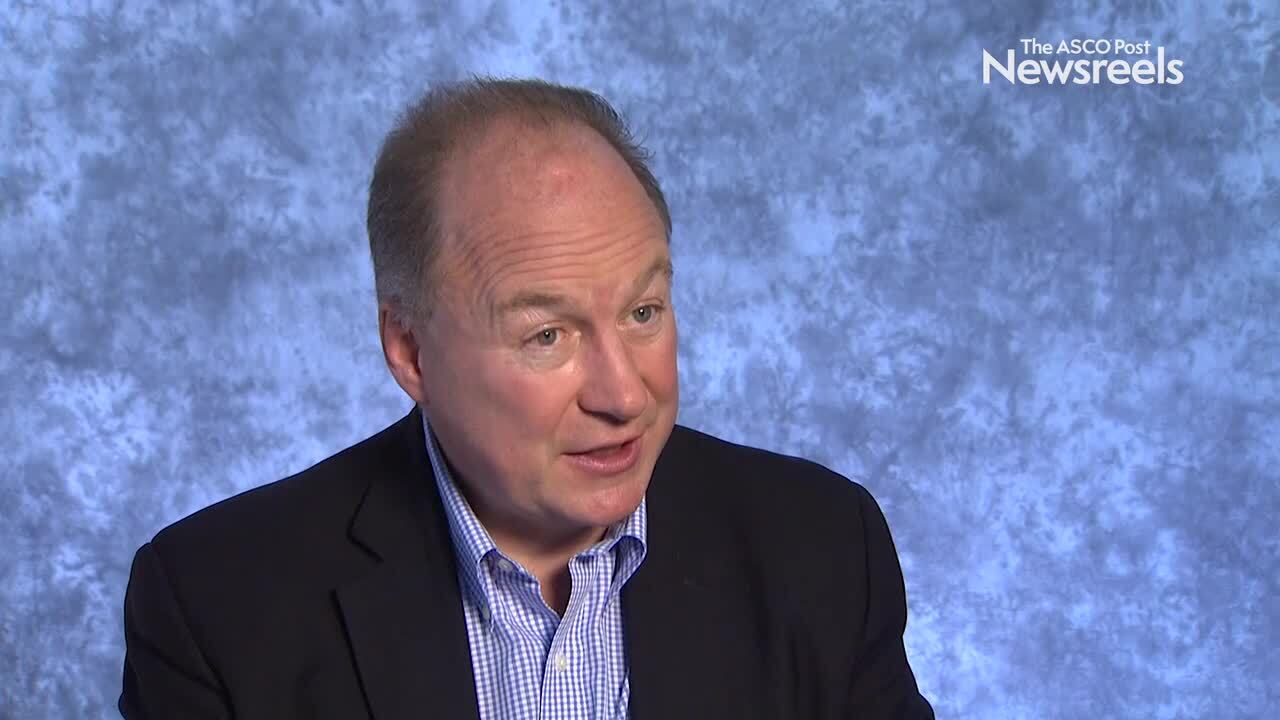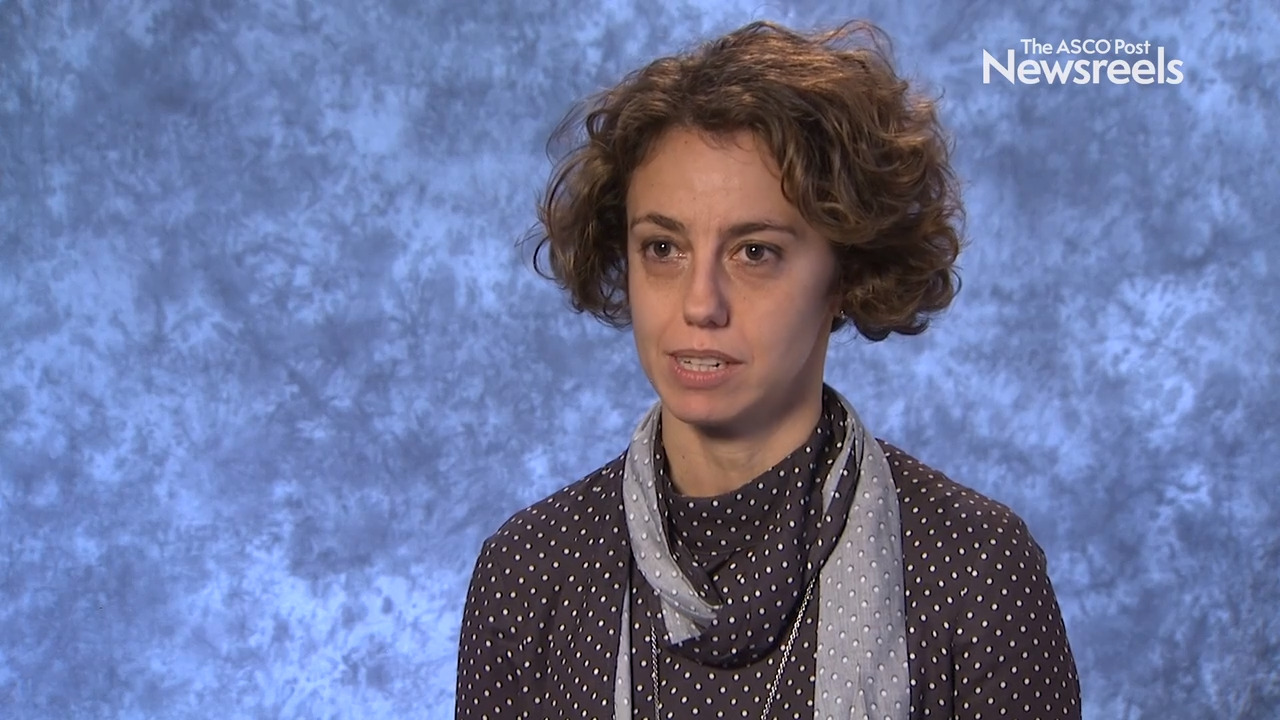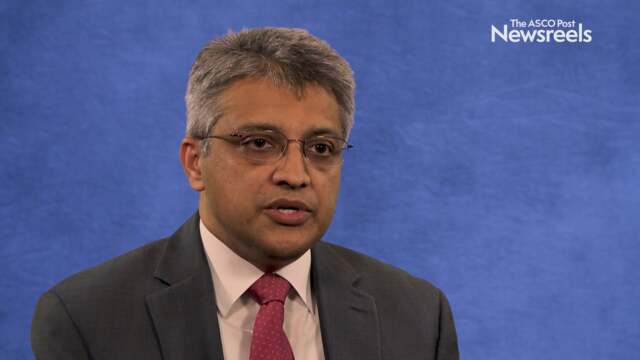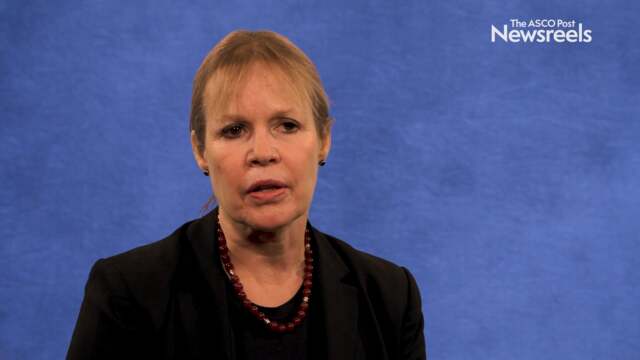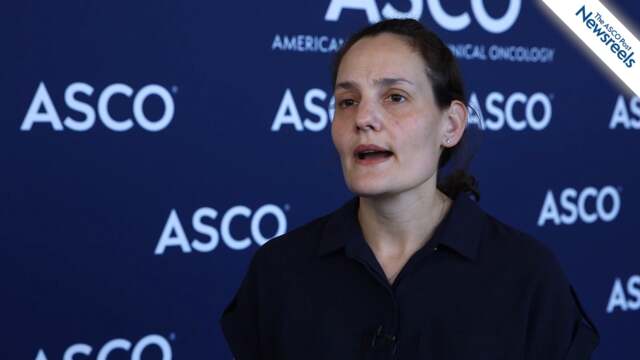Paul Richardson, MD, on Multiple Myeloma: Results From the OP-106 Horizon Trial
Paul Richardson, MD, of Dana-Farber Cancer Institute, discusses updated results and the first report on progression-free survival for melflufen therapy administered to people with multiple myeloma that is refractory to daratumumab and/or pomalidomide (Abstract 600).
Francesca M. Gay, MD, on Multiple Myeloma: Results From the Forte Trial
Francesca M. Gay, MD, of GIMEMA, European Myeloma Network, discusses study findings on the use of carfilzomib in induction combination regimens with autologous transplantation, and consolidation regimens in newly diagnosed multiple myeloma (Abstract 121).
ELOQUENT-3: Addition of Elotuzumab to Pomalidomide and Dexamethasone in Previously Treated Multiple Myeloma
As reported in The New England Journal of Medicine by Dimopoulos et al, the phase II ELOQUENT-3 trial has shown that the addition of elotuzumab (Empliciti) to pomalidomide (Pomalyst) and dexamethasone significantly prolonged progression-free survival in patients with relapsed and/or refractory...
FDA Approves Elotuzumab Plus Pomalidomide and Dexamethasone for Relapsed or Refractory Multiple Myeloma
ON NOVEMBER 6, 2018, following Priority Review, the U.S. Food and Drug Administration (FDA) approved elotuzumab (Empliciti) injection for intravenous use in combination with pomalidomide (Pomalyst) and dexamethasone for the treatment of adult patients with multiple myeloma who have received at...
FDA Approves Elotuzumab Plus Pomalidomide and Dexamethasone for Relapsed or Refractory Multiple Myeloma
On November 6, the U.S. Food and Drug Administration (FDA) approved elotuzumab (Empliciti) injection for intravenous use in combination with pomalidomide (Pomalyst) and dexamethasone for the treatment of adult patients with multiple myeloma who have received at least two prior therapies,...
FDA Accepts New Drug Application, Grants Priority Review to Selinexor for Pentarefractory Multiple Myeloma
The U.S. Food and Drug Administration (FDA) has accepted a new drug application seeking accelerated approval for selinexor, a first-in-class, oral selective inhibitor of nuclear export (SINE) compound, as a new treatment for patients with pentarefractory multiple myeloma. The FDA...
Emerging Options and Sequencing Therapy in Relapsed Multiple Myeloma
Advances in the treatment of multiple myeloma have led to longer progression-free survival, but the majority of patients will still relapse despite newer treatments. A number of new drugs and combinations are under study in the hope of improving outcomes. “Multiple myeloma is a complex disease...
FDA Authorizes First Next-Generation Sequencing–Based Test to Detect Minimal Residual Disease in B-Cell ALL or Multiple Myeloma
The U.S. Food and Drug Administration (FDA) recently permitted marketing of the ClonoSEQ assay, a next-generation sequencing–based test for minimal residual disease in patients with B-cell acute lymphoblastic leukemia (ALL) or multiple myeloma. “At the FDA, we’re continuing to...
FDA Approves Once-Weekly Carfilzomib in Combination With Dexamethasone for Relapsed or Refractory Multiple Myeloma
Today, the U.S. Food and Drug Administration (FDA) approved a supplemental new drug application (sNDA) to expand the prescribing information for carfilzomib (Kyprolis) to include a once-weekly dosing option in combination with dexamethasone (once-weekly Kd70) for patients with relapsed or...
Shaji K. Kumar, MD, on Multiple Myeloma: Treatment Update
Shaji K. Kumar, MD, of the Mayo Clinic Cancer Center, discusses emerging therapeutic options for relapsed multiple myeloma and how best to sequence treatments.
Natalie S. Callander, MD, on Newly Diagnosed Multiple Myeloma: Expert Perspective
Natalie S. Callander, MD, of the University of Wisconsin Carbone Cancer Center, discusses key patient and clinical factors that influence first-line treatment choices, as well as the efficacy and tolerability of multiple myeloma therapies.
FDA Accepts sBLA for Elotuzumab Plus Pomalidomide and Low-Dose Dexamethasone in Patients With Relapsed or Refractory Multiple Myeloma
The U.S. Food and Drug Administration (FDA) recently accepted a supplemental biologics license application (sBLA) for elotuzumab (Empliciti) in combination with pomalidomide (Pomalyst) and low-dose dexamethasone for the treatment of patients with relapsed or refractory multiple myeloma who...
New Tool for Assessing Frailty Predicts Survival in Newly Diagnosed Multiple Myeloma
A new frailty index predicts overall survival for patients newly diagnosed with multiple myeloma, according to a study recently published in JCO Clinical Cancer Informatics (JCO CCI). This tool is important because frailty is a critical factor in treatment decision-making for many patients with...
Daratumumab in Newly Diagnosed Transplant-Ineligible Multiple Myeloma
In May 2018, daratumumab (Darzalex) was approved for use in combination with VMP (bortezomib, melphalan, and prednisone) in the treatment of patients with newly diagnosed multiple myeloma who are ineligible for autologous stem cell transplantation.1 Supporting Efficacy Data Approval was based on...
Drug Combination Design for Multiple Myeloma Using an AI Platform
A multidisciplinary team of researchers from the National University of Singapore (NUS) has developed an artificial intelligence (AI) technology platform that could potentially change the way drug combinations are being designed, hence enabling doctors to determine the most effective drug...
New Tool for Assessing Frailty in Patients With Newly Diagnosed Multiple Myeloma
A NEW “frailty index” may predict overall survival for patients newly diagnosed with multiple myeloma, according to a study published in JCO Clinical Cancer Informatics.1 Frailty is a critical factor in treatment decision-making for many patients with multiple myeloma, as many of these patients are ...
New Frontiers Being Explored in Multiple Myeloma
BEFORE TOO LONG, oncologists can expect to have an entirely new arsenal in the fight against multiple myeloma. Cutting-edge therapies on the near horizon were described in a presentation by Kenneth Anderson, MD, at the 2018 American Association of Cancer Research’s (AACR’s) inaugural conference on...
FDA Grants Orphan Drug Designation to SRF231 for Treatment of Multiple Myeloma
The U.S. Food and Drug Administration (FDA) has granted Orphan Drug designation to SRF231 for the treatment of patients with multiple myeloma. SRF231 is a fully human antibody that inhibits the activity of CD47, a protein overexpressed on many types of cancer cells, which prevents them from being...
New Tool for Assessing Frailty May Aid in Predicting Survival in Newly Diagnosed Multiple Myeloma
A new frailty index may aid in predicting overall survival for patients newly diagnosed with multiple myeloma, according to a study published by Mian et al in JCO Clinical Cancer Informatics. This tool is important because frailty is a critical factor in treatment decision-making for ...
FDA Grants Fast Track Designation to Galinpepimut-S in Multiple Myeloma
The U.S. Food and Drug Administration (FDA) has granted Fast Track designation to galinpepimut-S for the treatment of multiple myeloma. Galinpepimut-S is licensed from Memorial Sloan Kettering Cancer Center and targets the Wilms tumor 1 (WT1) protein, which is present in an array of tumor types....
Phase III TOURMALINE-MM3 Trial of Ixazomib as Maintenance Therapy in Patients With Multiple Myeloma Posttransplant
The randomized, phase III TOURMALINE-MM3 study met its primary endpoint, demonstrating single-agent oral ixazomib (Ninlaro) as a maintenance therapy resulted in a statistically significant improvement in progression-free survival (PFS) vs placebo. The trial evaluated the effect of ixazomib as a...
Expert Point of View: Parameswaran Hari, MD
FORMAL DISCUSSANT Parameswaran Hari, MD, of the Medical College of Wisconsin, Milwaukee, was impressed by many aspects of the bb2121 study, which represents the “largest and most mature” data set for the chimeric antigen receptor (CAR) T-cell approach in myeloma, he noted. According to Dr. Hari,...
CAR T-Cell Therapy: Updated Data Remain Favorable in Heavily Pretreated Patients With Myeloma
IN AN UPDATE of a phase I trial, a heavily pretreated population of patients with multiple myeloma continued to respond to the chimeric antigen receptor (CAR) T-cell therapy bb2121.1 The results presented at the 2018 ASCO Annual Meeting confirmed previous findings for bb2121 in the dose-escalation...
CAR T Cells Targeting B-Cell Maturation Antigen in Poor-Prognosis Relapsed Multiple Myeloma
In a first-in-human study reported in the Journal of Clinical Oncology, Brudno et al found that chimeric antigen receptor (CAR) autologous T cells targeting B-cell maturation antigen (BCMA) produced responses in patients with poor-prognosis relapsed multiple myeloma. Study Details The current...
Once- vs Twice-Weekly Carfilzomib in Relapsed or Refractory Multiple Myeloma
An interim analysis of the phase III ARROW trial reported in The Lancet Oncology by Moreau et al indicated that a higher-dose once-weekly schedule of carfilzomib was associated with prolonged progression-free survival vs a twice-weekly schedule in patients with relapsed or refractory multiple...
EHA 2018: Elotuzumab Plus Pomalidomide and Low-Dose Dexamethasone vs Pomalidomide/Dexamethasone Alone in Relapsed or Refractory Multiple Myeloma
The ELOQUENT-3 trial, an international phase II study evaluating the addition of elotuzumab (Empliciti) to pomalidomide (Pomalyst) and low-dose dexamethasone in patients with relapsed/refractory multiple myeloma, achieved its primary endpoint, showing a statistically significant and clinically...
Studies of Daratumumab in Combination With Anti–PD-L1 Agents Stopped
On May 26, Genmab A/S announced that following a planned review, the Data Monitoring Committee (DMC) has recommended that the phase Ib/II study (CALLISTO/LUC2001) of daratumumab (Darzalex) in combination with the anti–programmed cell death ligand 1 (PD-L1) antibody atezolizumab (Tecentriq) vs ...
2018 ASCO: Pomalidomide, Bortezomib, and Low-Dose Dexamethasone in Relapsed or Refractory Multiple Myeloma
For patients with multiple myeloma who have been treated with lenalidome (Revlimid) but have relapsed and not responded to other therapy, a three-drug combination can significantly extend the time in which the disease is held in check. The findings of the phase III OPTIMISMM trial were presented by ...
Aviva C. Krauss, MD, on Multiple Myeloma: Treatment Trials Analysis
Aviva C. Krauss, MD, of the U.S. Food and Drug Administration, discusses findings on an FDA analysis of immune-related adverse events and response to pembrolizumab in multiple myeloma (Abstract 8008).
FDA Grants Orphan Drug Designation to Galinpepimut-S for Treatment of Multiple Myeloma
The U.S. Food and Drug Administration (FDA) recently granted Orphan Drug designation to galinpepimut-S for the treatment of multiple myeloma. The drug is licensed from Memorial Sloan Kettering Cancer Center and targets the Wilms tumor 1 (WT1) protein, which is present in an array of tumor...
FDA Approves Daratumumab/VMP Combination for Newly Diagnosed Multiple Myeloma
On May 7, the U.S. Food and Drug Administration(FDA) approved daratumumab (Darzalex) in combination with bortezomib (Velcade), a proteasome inhibitor; melphalan, an alkylating agent; and prednisone—VMP—for the treatment of patients with newly diagnosed multiple myeloma who are ineligible for...
FDA Approves Daratumumab in Combination With VMP for Newly Diagnosed Patients With Multiple Myeloma Who Are Transplant-Ineligible
On May 7, the U.S. Food and Drug Administration (FDA) approved daratumumab (Darzalex) in combination with bortezomib (Velcade), a proteasome inhibitor; melphalan, an alkylating agent; and prednisone—VMP—for the treatment of patients with newly diagnosed multiple myeloma who are...
Role of Bone-Modifying Agents in Multiple Myeloma
As reported in the Journal of Clinical Oncology by Kenneth C. Anderson, MD, of Dana-Farber Cancer Institute, and colleagues, ASCO has issued a clinical practice guideline update on the role of bone-modifying agents in multiple myeloma.1 The update was performed by an expert panel systematic...
Multiple Myeloma Research Foundation Awards $7M to Advance Immunotherapy Research
The Multiple Myeloma Research Foundation announced that, as part of its $15M Immunotherapy Initiative, it has awarded $7 million to fund three research programs led by myeloma researchers. The Immunotherapy Initiative, through the formation of highly collaborative, multidisciplinary Immune Networks ...
MGUS and Multiple Myeloma in 9/11 Firefighters
A study by Landgren et al in JAMA Oncology has found that New York City firefighters exposed to the 9/11 World Trade Center (WTC) disaster site face an increased risk for developing monoclonal gammopathy of undetermined significance (MGUS), a myeloma precursor disease. The study was conducted...
Updated International Myeloma Working Group Criteria: Diagnostic Challenges
The ASCO Post is pleased to present Hematology Expert Review, an ongoing feature that quizzes readers on issues in hematology. In this installment, Drs. Abutalib and Landgren review the underlying data that shaped the updated International Myeloma Working Group (IMWG) diagnostic criteria for...
Selinexor Receives Fast Track Designation From the FDA in Pentarefractory Multiple Myeloma
On April 10, the U.S. Food and Drug Administration (FDA) granted Fast Track designation to the oral selective inhibitor of nuclear export (SINE) compound selinexor for the treatment of patients with multiple myeloma who have received at least three prior lines of therapy. The FDA’s...
Cardiovascular Toxicity and Carfilzomib Treatment in Multiple Myeloma
The proteasome inhibitor carfilzomib (Kyprolis) has taken on an increasing role in the treatment of multiple myeloma, but new research from the Abramson Cancer Center of the University of Pennsylvania shows the therapy may come with the risk of cardiovascular problems in a higher-than-expected...
EXPERT POINT OF VIEW: Kenneth C. Anderson, MD, and S. Vincent Rajkumar, MD
AT A PREMEETING webinar, American Society of Hematology then President Kenneth C. Anderson, MD, Director of the Lebow Institute for Myeloma Therapeutics and Jerome Lipper Myeloma Center at Dana-Farber Cancer Institute, Boston, commented: “This study demonstrates this new treatment has good...
Unique CAR T-Cell Construct Studied in Multiple Myeloma
CD19-DIRECTED chimeric antigen receptor (CAR) T-cell therapy has been approved by the U.S. Food and Drug Administration for the treatment of leukemia (tisagenlecleucel [Kymriah]) and lymphoma (axicabtagene ciloleucel [Yescarta]), but another type of CAR T-cell therapy is generating interest as a...
EXPERT POINT OF VIEW: Andrzej Jakubowiak, MD, PhD
INTERVIEWED BY The ASCO Post, Andrzej Jakubowiak, MD, PhD, Director of the Multiple Myeloma Program at the University of Chicago Medical Center, commented on the “controversial findings” of EMN02/HO95. “This European study has opened the gate toward showing the benefit of a second transplant,...
European Study Shows Double Transplant Improves Survival in Myeloma
FOR NEWLY DIAGNOSED patients with multiple myeloma considered to be at high risk of disease progression, double autologous stem cell transplantation (ASCT) significantly prolongs progression-free and overall survival, vs single transplant, according to the phase III EMN02/HO95 study. The findings...
Analysis of Carfilzomib-Related Cardiotoxicity
In a systematic review and meta-analysis reported in Leukemia & Lymphoma, Shah et al identified the risk of cardiotoxicity among patients, most with multiple myeloma, receiving carfilzomib (Kyprolis) in clinical trials. Study Details The study included data from 4,164 patients who received...
Denosumab vs Zoledronic Acid in Newly Diagnosed Multiple Myeloma With Bone Disease
In a phase III trial reported in The Lancet Oncology, Raje et al found that denosumab was noninferior to zoledronic acid in preventing skeletal-related events (SREs) in newly diagnosed multiple myeloma patients with bone disease. Study Details In the double-blind trial, 1,718 patients with at...
Overall Survival With Carfilzomib vs Bortezomib in Relapsed or Refractory Multiple Myeloma
As reported by Meletios A. Dimopoulos, MD, of the National and Kapodistrian University of Athens, Alexandra Hospital, and colleagues in The Lancet Oncology, a prespecified interim analysis of the phase III ENDEAVOR trial has shown a significant overall survival benefit for carfilzomib (Kyprolis)...
Results From Phase III ARROW Study of Once-Weekly Carfilzomib in Relapsed or Refractory Multiple Myeloma
TOPLINE RESULTS of the phase III ARROW trial (ClinicalTrials.gov identifier NCT02412878) were recently announced by Amgen. The study showed carfilzomib (Kyprolis) administered once weekly at 70 mg/m2 with dexamethasone allowed patients with relapsed or refractory multiple myeloma to live 3.6 months ...
Pomalidomide and Low-Dose Dexamethasone in Patients With Multiple Myeloma and Renal Impairment
In a European phase II trial reported in the Journal of Clinical Oncology, Dimopoulos et al found that pomalidomide (Pomalyst) plus low-dose dexamethasone produced responses in patients with relapsed or refractory multiple myeloma and renal impairment. Study Details In the study, 81 patients with ...
Selective Inhibition of Nuclear Export in Heavily Pretreated Relapsed or Refractory Multiple Myeloma
In a phase II trial reported in the Journal of Clinical Oncology, Vogl et al found that the investigational oral selective exportin 1 (XPO1) inhibitor selinexor combined with dexamethasone produced responses in patients with heavily pretreated relapsed or refractory multiple myeloma. ...
EXPERT POINT OF VIEW: Ken Shain, MD
KEN SHAIN, MD, Assistant Member of the Department of Malignant Hematology and Tumor Biology, Moffitt Cancer Center in Tampa, Florida, and Scientific Director of the Moffitt Myeloma Working Group, moderated the session where the study was presented and offered comments to The ASCO Post. “Professor...
For Patients Treated for Myeloma, Antibiotic Prophylaxis May Reduce Infections and Deaths
IN PATIENTS undergoing treatment of multiple myeloma, the prophylactic use of levofloxacin significantly reduced febrile episodes and deaths, without increasing healthcare-associated infections or carriage of key nosocomial pathogens, in a large multicenter study from the United Kingdom.1 The...
